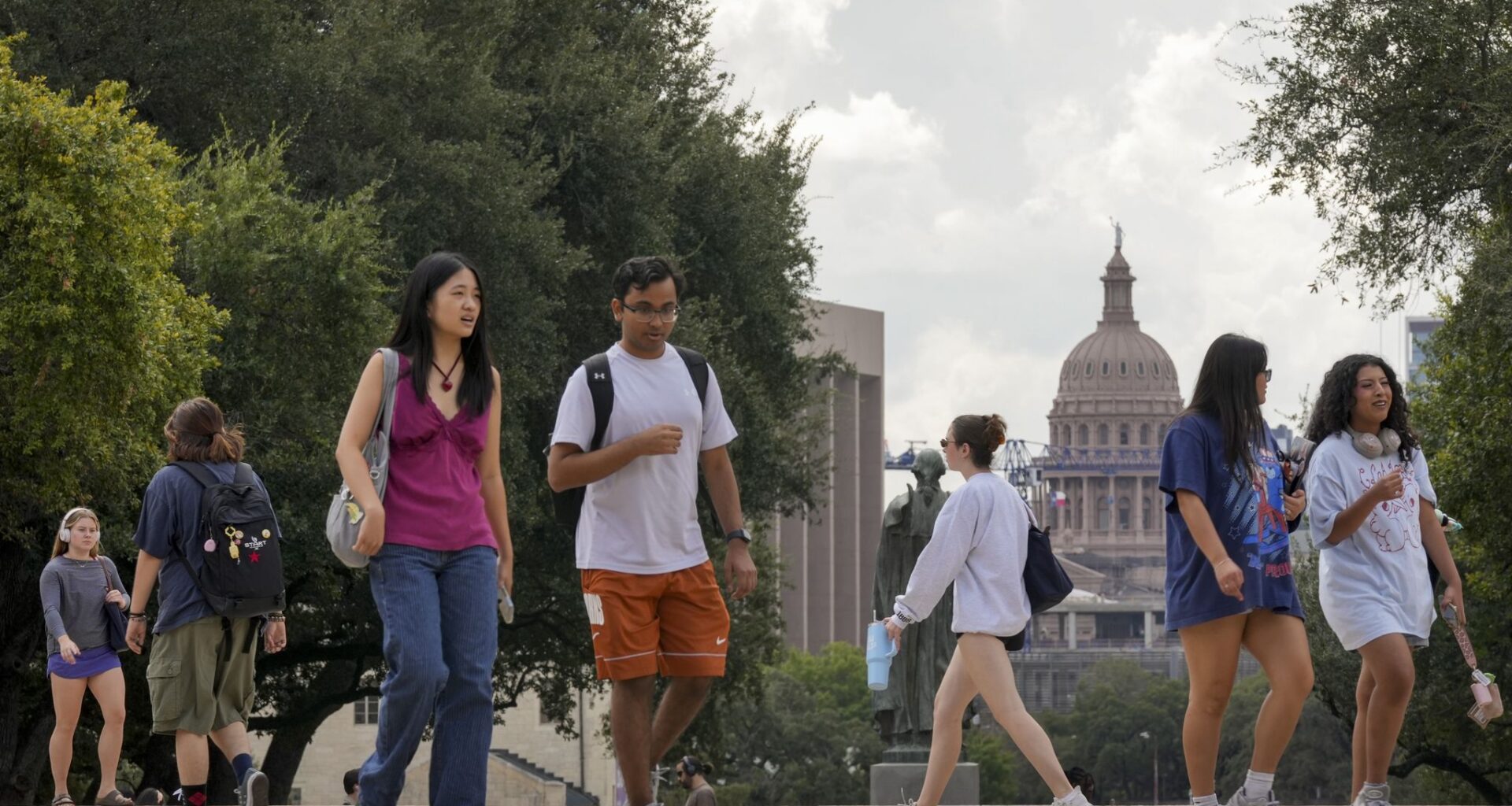University of Texas President Jim Davis throws the horns at his Oct. 22 investiture ceremony at Hogg Memorial Auditorium.
Jay Janner/Austin American-Statesman
I recently received an email from the American-Statesman summarizing the Oct. 22 investiture address by new University of Texas President Jim Davis. According to the report, Davis pledged that UT would “recommit to its mission, regain the public’s trust and broaden its diversity of viewpoints in the core curriculum.”
I purposely highlight the word diversity because I couldn’t find it anywhere in Davis’s actual speech. As we know, diversity — at least as in “DEI” — has been banned at public universities by the Texas government.
Article continues below this ad
Davis opened his remarks by recalling the 1960s, describing UT as a place of ideas and contradictions where students like Janis Joplin and Farrah Fawcett walked the same campus. I was there, too — a Chicano boy from El Paso who would later become a pharmacy professor at UT.
I was one of only a handful of Mexican American students in my classes. Few professors looked like me, and fewer still seemed to understand the barriers we faced. My years at UT taught me as much about perseverance and identity as they did about chemistry or pharmacology.
What I saw in those years was America in turmoil: the assassinations of JFK, MLK, RFK and Malcolm X; civil rights marches by Black and Chicano activists; and Vietnam War protests that shook our campuses. UT, meanwhile, remained overwhelmingly white. Its 1969 championship football team didn’t have a single Black player.
Like Davis, I credit UT with shaping my mind — but not in the same way. I learned to cope with discrimination, to juggle work and study, to embrace my Mexican heritage and to see that some issues are not gray but painfully black and white.
Article continues below this ad
So what word does Davis use instead of diversity? Three, actually: value, balance and completeness. He quotes the poet Walt Whitman — “I am large, I contain multitudes” — to suggest that a great university should also contain multitudes of ideas. Davis declares, “We are multitudes.”
University of Texas students walk on campus blocks away from the state Capitol. A truly great university should embrace both the diversity of people who make up Texas and the diversity of thought they bring, Daniel Acosta, Jr. writes.
Jay Janner/Austin American-Statesman
I wholeheartedly agree — if those “multitudes” include both the diversity of people who make up Texas and the diversity of thought they bring. A truly great university embraces both.
Diversity is not just a buzzword about representation; it’s the foundation of inquiry itself. Different backgrounds and experiences generate new ways of thinking — something no curriculum reform can substitute for, no matter how elegantly it’s packaged.
Article continues below this ad
Davis is right that UT must build a curriculum of the highest value, rooted in excellence and integrity. But he offers few specifics about how this new curriculum will take shape. His call for “balance,” for example, seems to mean broadening degree programs that are too narrow. Yet it’s unclear how this expansion would work in practice. Would a four-year degree now take five years to complete?
As for “completeness,” Davis proposes adding courses from the new School of Civic Leadership and the Center for Texas History to the curriculum that all students must take to graduate. I remember taking Texas history and government as an undergraduate; is this a return to that model? The idea may have merit, but again, the devil is in the details.
I applaud the impulse to reconnect students with civic history, but without clear plans or faculty oversight, the effort risks becoming symbolism without substance — another slogan instead of a solution.
Without a faculty senate — effectively curbed by the Texas Legislature — it’s hard to see how these sweeping curricular changes will be debated or refined. Faculty input has always been essential to academic quality and shared governance.
Article continues below this ad
Davis says he wants to make UT “great again.” I wish him success. But greatness will depend not only on new schools or slogans, but on whether UT continues to welcome the full range of people and perspectives that make Texas what it is.
The Texas I know has always contained multitudes — of people, languages and ideas. If UT is to lead the state, it must reflect all those multitudes, not just quote them.
Daniel Acosta, Jr. is the former UT graduate director of toxicology and dean emeritus of pharmacy at the University of Cincinnati Medical Center.
Article continues below this ad

